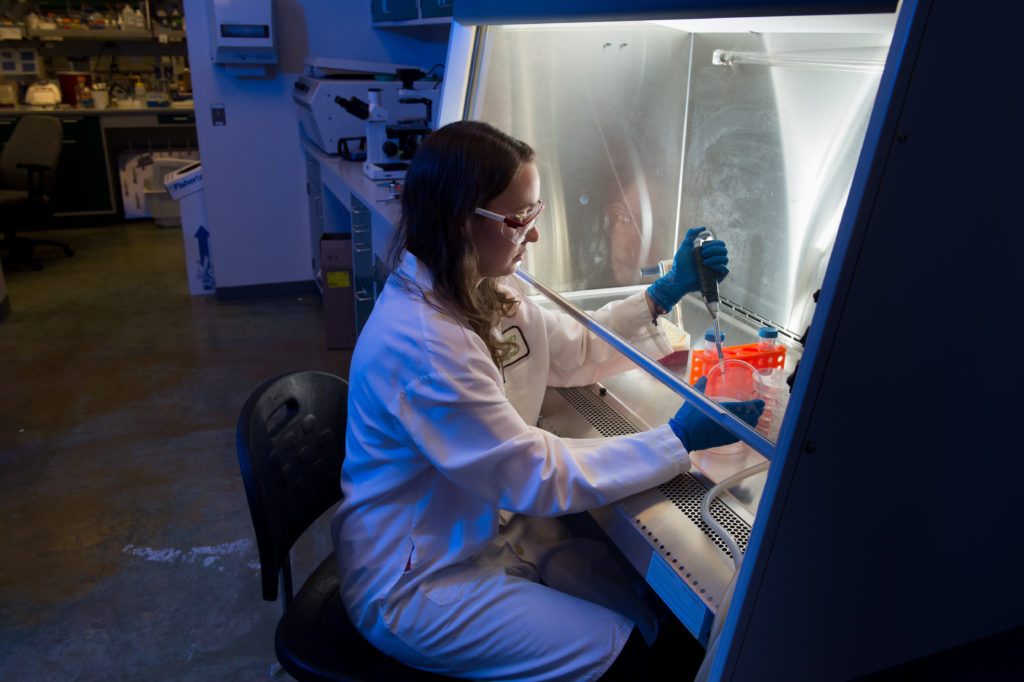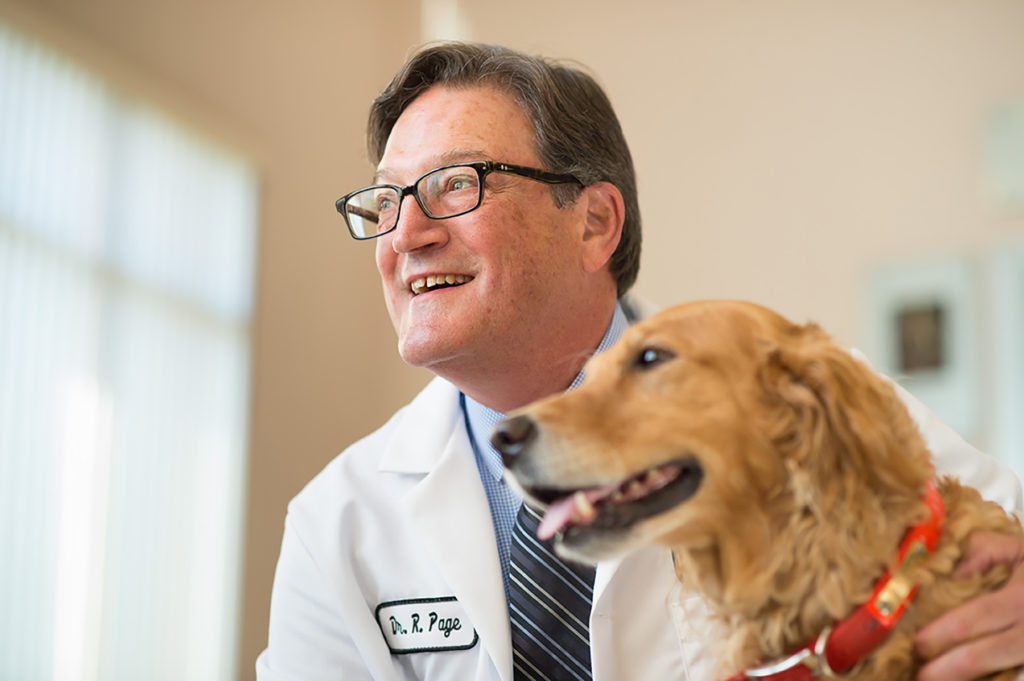
For 40 years, the Flint Animal Cancer Center has been at the forefront of understanding the fundamental mechanisms of cancer biology, disease diagnosis, and the development of effective therapies. Our focus is on comparative oncology to improve the prevention, diagnosis, and treatment of cancer in pet animals, and translate our research and knowledge also to benefit people with cancer. To support that work, the Flint Animal Cancer Center has many established research programs that study many aspects of cancer, including cancer biology, clinical pathology, clinical immunology, and experimental therapeutics.
Our staff includes both basic scientists and clinical researchers. These teams work together to move new therapies from the lab to the clinic. Through our Biorepository, our basic scientists have access to more than 25,000 biological samples (tumor tissue, normal tissue, and fluids) donated by the families of our clinic patients.
Disrupting the Status Quo in Cancer Research
The Flint Animal Cancer Center works closely with the University of Colorado Cancer Center. Together, we are partners in the world’s most advanced comparative oncology research program. Our work is revolutionizing cancer research by building bridges between animal and human cancer. Through many collaborative projects, our scientists and clinicians are working with their teams to develop new treatment strategies that can be rapidly and safely studied in pet dogs to inform studies in people. While a clinical trial may take 5-10 years in humans, it may only take 1-2 years in dogs, which means less time before researchers know if a treatment works.
The Flint Animal Cancer Center is also home to the The CU Cancer Center Pharmacology Shared Resource (PharmSR). It was established to work with researchers and clinicians in a collaborative manner to design and implement studies to measure xenobiotics (drugs, toxicants, natural products, etc.) in biological systems.
Flint Animal Cancer Center Research Programs
Biorepository
The Biorepository accumulates, curates, and stores samples from patients with cancer evaluated at the Flint Animal Cancer Center. Approximately 25,000 samples for tumor/normal tissue and associated fluids in a variety of formats (frozen, FFPE, RNA later) are available. Annotated electronic medical records are available for sample sets.
Cancer Biology and Experimental Therapeutics
The Cancer Biology and Experimental Therapeutics laboratory has developed and maintains approximately 30 canine and four feline cell lines for use in screening and identification of novel products. Cell lines have been validated and are in the process of undergoing expression profiling, DNA and miRNA sequencing. Common molecular assays and in vivo xenograft and bioluminescence studies are available.
Clinical Hematopathology
A high-throughput service laboratory offering clinical screening and diagnosis of lymphoproliferative diseases in dogs. Characterization of lymphatic cancers through immunophenotypic and molecular assays is frequently incorporated into research protocols.
Clinical Trials
The Flint Animal Cancer Center clinical trials program is one of the largest in veterinary medicine and includes seven dedicated staff members. The program manages 30- 35 clinical trials each year to study more effective therapies for a variety of cancer types including, osteosarcoma, lymphoma, soft tissue sarcoma, and brain tumors.
Comparative Radiation Oncology
The Comparative Radiation Oncology Laboratory is exploring how novel experimental therapeutics influence the efficacy of radiation therapy through normal tissue and tumor microenvironmental effects.
Diagnostic Imaging
The Veterinary Diagnostic Imaging Department actively participates in multiple oncology-based studies, providing non-invasive imaging services ranging from radiographs and ultrasound to advanced imaging and nuclear medicine with targeted imaging probes.
Experimental Immunotherapy
The Experimental Immunotherapy program focuses on monocyte-mediated vaccine strategies for cancer and myeloid-suppressor cell assessment. All current immune function and detection assays are available.
Investigational Pathology
The long-term research goal of the Investigational Pathology lab is to fully elucidate the mechanisms by which tumors prime non-malignant host stromal cells of distant organs to promote their metastasis and chemo-resistance, to identify novel targets for host-directed stromal therapies which “poison the soil” for effective combination with conventional tumor cell targeted drugs.
Molecular Oncology and Functional Genomics
The focus of Molecular Oncology and Functional Genomics program is defining the mechanisms of gene expression, genomics, and biomarker development in canine cancers. This laboratory also provides a cell-line validation service for canine and feline cell lines.
Musculoskeletal Oncology and Trauma
The Musculoskeletal Oncology and Trauma lab offers advanced preclinical models to study orthopedic cancers or trauma that put limbs at risk. Mesenchymal stem cell strategies for massive defect repair is of current emphasis.
Pathology/Immuno-Pathology
The Pathology/Immuno-Pathology lab develops and uses biomarker assays in cancer of companion and laboratory animals. New automated staining and quantitation technology, study design and planning, as well as veterinary pathology expertise are available.
Pharmacology
The pharmacology facilities serve as the Shared Resource for the CU Comprehensive Cancer Center and also represents the pharmacology core for the Colorado Clinical and Translational Science Institute at the CU Medical School. Recent upgrades to state-of-the-art analytic technology were accomplished in 2014. All assay development, PK/PD and modeling services are available (GLP if needed).
Radiation Physics and Biology
CSU has been an international leader in radiation biology and physics for many years. Within the Flint Animal Cancer Center, radiation research includes basic and clinical applications of radiation and multimodality therapeutics.
Surgical Oncology
Surgery remains one of the pillars of treating cancer in animals and humans. Surgical oncology research at Colorado State University aims to understand better and refine its role to improve the outcome and quality of life of patients.
Golden Retriever Lifetime Study

The Golden Retriever Lifetime Study is the largest and most comprehensive observational study ever attempted in veterinary medicine in the United States. Flint Animal Cancer Center director, Dr. Rodney Page, is the project’s principal investigator and chair of the Scientific Steering Committee. We are proud to partner with the Morris Animal Foundation on this vital research.